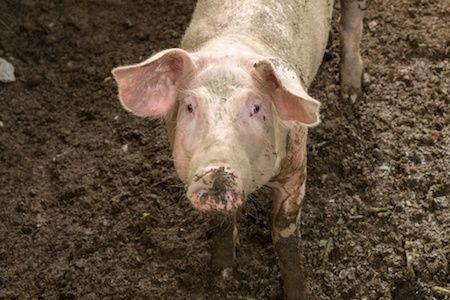Article
Researchers Suspect Traces of C. difficile in Manure Compost From Pigs
Author(s):
Key Takeaways
- C. difficile can survive in manure compost, posing a risk of entering the food chain through improper composting.
- The bacteria thrive at moderate temperatures but decrease at higher temperatures, with no growth at 4°C.
Traces of Clostridium difficile bacteria are occasionally found in the final products of manure compost and can even transfer C. difficile into the food chain.

Traces of Clostridium difficile (C. difficile) bacteria are occasionally found in the final products of manure compost and can even transfer C. difficile into the food chain, according to new findings.
Researchers from a veterinary medicine school in Hokkaido, Japan conducted a two-part study to determine the temperatures at which C. difficile can survive from pig and piglet feces and its prevalence in manure. First, the study authors noted that while the bacteria can be transmitted to humans from meat products during the slaughter process, the rates of this happening in slaughtered pigs were remarkably lower than that from piglet feces.
In the first prong of the study, pig feces were collected from at least eight pigs at one farm and the researchers artificially inoculated C. difficile spores into pig feces and incubated at several temperatures. The investigators also identified and characterized C. difficile strains from field manure compost obtained from 14 pig farms.
The researchers did not observe any rifampicin or ciprofloxacin resistant bacteria in the pigs’ fecal samples before the artificial inoculation took place. At a temperature of 4°C (39 °F), there was no C. difficile growth, but the bacteria population increased at temperatures of 25 °C (77 °F) and 37 °C (98 °F). However, there was no decrease in bacteria concentration observed even at 30 days after the inoculation.
The team noted that the C. difficile population decreased gradually at higher temperatures, such as 55 °C (131 °F), 60 °C (140 °F), and 70 °C (158 °F). There were significant bacteria increases observed from days 5, 2, and 1 after inoculation at the 55 °C, 60 °C, and 70 °C temperatures. Additionally, the researchers discovered that there appeared to be no rifampicin resistant C. difficile detected on days 30, 10 and 5 after inoculation at temperatures of 55 °C, 60 °C, and 70 °C.
In the second part of the study, where the researchers isolated C. difficile from manure compost samples, the team found the bacteria in five of 14 samples after enrichment culturing. In total, they determined, those five samples were comprised of 11 distinct C. difficile strains. The 11 strains were all susceptible to vancomycin, metronidazole, and ceftriaxone. Resistance against tetracycline, erythromycin, clindamycin, ciprofloxacin, and levofloxacin were found in three, six, seven, nine, and four of the 11 strains tested, respectively, the researchers wrote.
“We show that manure compost derived from pig farms might contain C. difficile, including hypervirulent strains,” the researchers concluded, while adding that even during proper composting, C. difficile spores could survive. “Thus, the application of fresh manure or incompletely composted manure to land potentially increases the risk of C. difficile transfer to the food chain. Therefore, the survival of C. difficile in fully processed manure compost is an important aspect that should not be ignored.”
The paper, “Survival and prevalence of Clostridium difficile in manure compost derived from pigs,” was published in the journal Anaerobe.
Another MD Magazine article, titled “Turkey, Stuffing, and a Side of Food Poisoning,” explored other ways that C. difficile bacteria can enter the food chain, and even be considered a food borne illness.
Related Coverage:
Fecal Transplants Considered as Effective as Antibiotic Treatment for C. difficile Infections
Oral Antibiotic Can Prevent C. difficile Infections in Stem Cell Recipients





